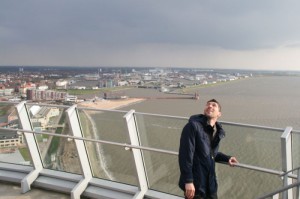– Writt en by Dr. Szabolcs Szikszai, Ph.D., Senior Lecturer –
en by Dr. Szabolcs Szikszai, Ph.D., Senior Lecturer –
In 2011, I was invited to lecture as an Erasmus professor in Hochschule Bremen by an earlier student/colleague of mine, Adél Németh and her local PhD consultant, Prof. Dr. Hans-Martin Niemeier, who gave three guest lectures on the International Week at the University of Pannonia back in September 2010. While I was in Bremen I gave three lectures on the macroeconomic situation and the current issues in Hungary which all met with overwhelming interest from faculty and students alike. Unsurprisingly, students in Germany are very much aware of the current state of economic and political affairs in Hungary and were more than happy to share their experiences with me. From them I learned that a new party called the Pirates (Piraten) is gaining more and more supporters in the German political arena at the expense of the Green party and is extremely popular with the youth although it lacks a clear economic policy strategy. (Shortly afterwards, I actually bumped into a demonstration against the hunger-promoting policies of Deutsche Bank attended by Piraten members, amongst others. By the way, the demostration, however politically delicate the issue, proceeded in a very peaceful and organized fashion.) I could also spend ample time getting to know faculty at both the Hochschule and the Jacobs University, the latter private school now being Adél’s host university for her remaining time as a PhD student in the aviation industry. I was especially happy to see an alumna of the University of Pannonia – and an ex-student of our doctoral school – have professional reputation in Germany: Adél is often interviewed and cited by leading German and other European newspapers and journals as an aviation expert!
For those who have yet to visit, the 400,000-strong Bremen is one of the three independent city states in Germany besides Berlin and Hamburg. Its people are extremely proud of their long history of democracy and self-governance dating back to the XII. century. In fact, one of the main sights, the statue of the vigilant Roland facing the monumental Cathedral St. Petri, is a stark reminder of the long and arduous struggle for civic independence from the Church. A stroll along the bank of river Weser also offers a whiff of freedom as well as nice and salty breezes of fresh air, excellent beer and an infinite variety of fish plates. The city is also a paradise for soccer fans, who have the chance to see Claudio Pizarro in the pitch every week. (On my first day, I actually drifted into an endless streak of fans flocking towards Weser stadium. I only missed the game because I had a shopping bag full of goodies in one hand and a glass of wine in the other, which I would have had a hard time explaining to the gatekeepers at the stadium.) And last but not least, Bremen is very close – thanks to Deutsche Bahn – to Bremerhaven (60km) and Hamburg (120km), both of which I was lucky enough to visit briefly over the course of my 10-day stay (see photo made on Aussichtsplattform SAIL City in Bremerhaven where you have a beautiful view over the horn of Weser and the harbor).
As the German saying suggests, „you never get a second chance to make a first impression”. Well, for me, Bremen does not need a second chance. I would encourage all students of business and economic studies to capitalize on the opportunity offered by our renewed BA-level Erasmus cooperation – which will hopefully be extended to the MA level after my discussion with the Dean of the Business School – and spend an academically and personally inspiring semester at the Hochschule Bremen.
